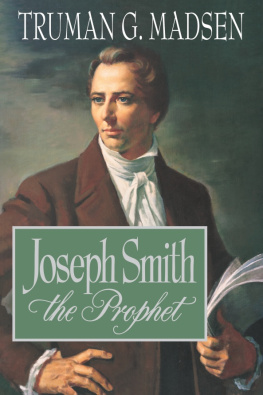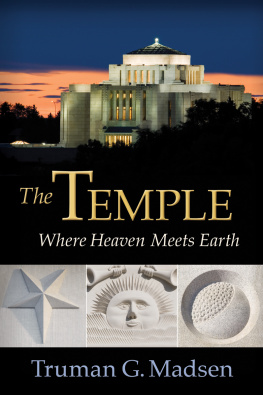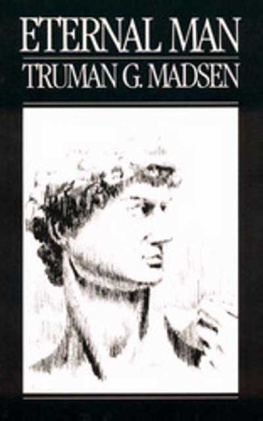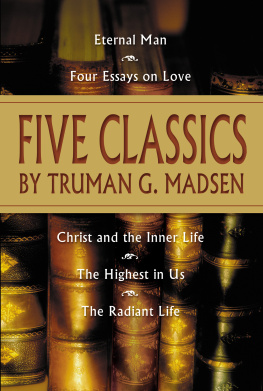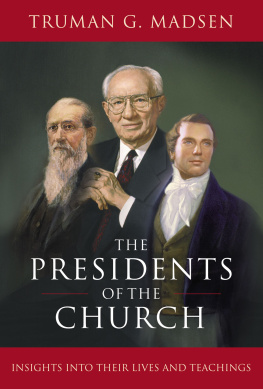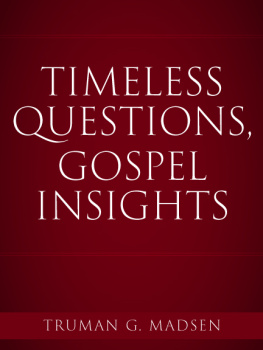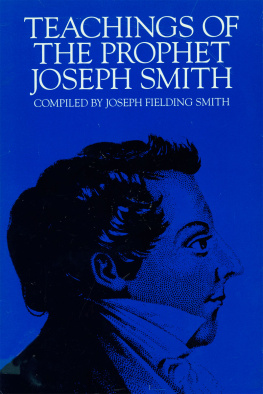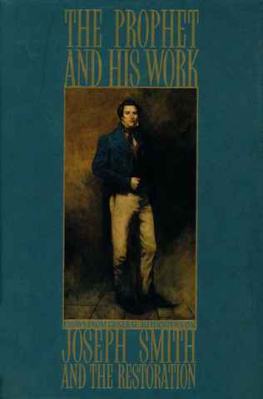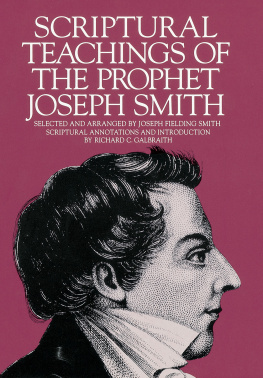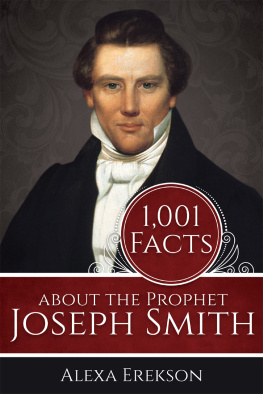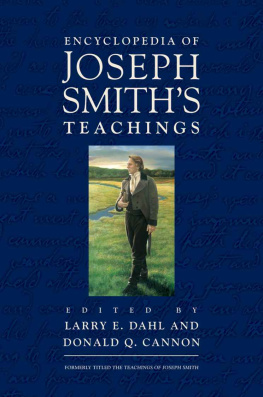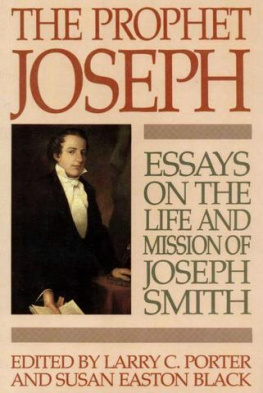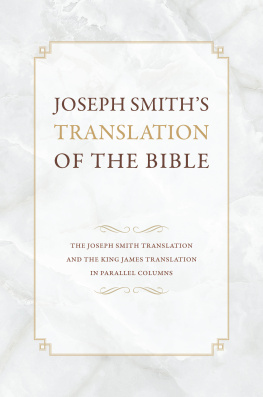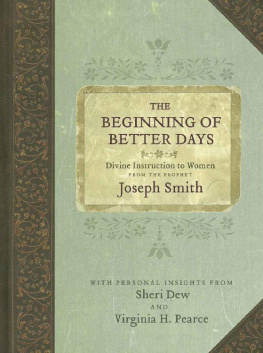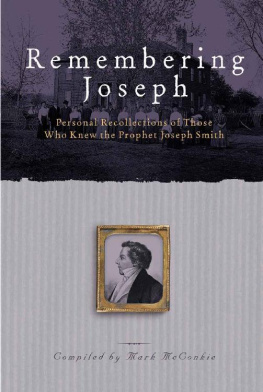Joseph Smith the Prophet
Truman G. Madsen
1989 Truman G. Madsen.
All rights reserved. No part of this book may be reproduced in any form or by any means without permission in writing from the publisher, Deseret Book Company, P.O. Box 30178, Salt Lake City Utah 30178. This work is not an official publication of The Church of Jesus Christ of Latter-day Saints. The views expressed herein are the responsibility of the author and do not necessarily represent the position of the Church or of Deseret Book. Deseret Book is a registered trademark of Deseret Book Company.
Introduction
Here is the printed version of the "Joseph Smith tapes."
More than all else I have written or recorded, these cassettes have engendered a return wave, international in scope, of responsive letters and comments. Apparently we live in a new era of catch-all listening: the padded earphones of the "Walkman," the car-cassette playback, the ever-faster computer access to ever-larger "databases."
Recurrent questions include these: Where were the lectures given? To whom was I talking? Why was the material recorded instead of written? Whence my long-standing interest in Joseph Smith? How is it that I talk as if I know him? How reliable are the many documents I cite, and where can they be found? Where might one go to read more? The most frequent query has been, "When are you going to publish the lectures and provide the sources?"
The lectures were delivered at Brigham Young University's Marriott Center during an Education Week. That a goodly number came to give eight hours of undivided-or even divided-attention to these two-a-day classes was a manifestation of the richness of the subject. The audience was "in-house." With them I could begin with presumptions and assurances which to others would have appeared startling. But between the lines I was also thinking of many who had posed penetrating queries about Joseph Smith over the years, both in and out of the classroom. They were an "invisible" audience. And at certain points it is apparent that I was addressing them, in a kind of underground conversation, more than those present.
My motive in tape recording rather than writing was to press through the written sources to the center of the man. Elsewhere, and in a technical way, I have written much about the teachings of Joseph Smith (see bibliography). Here the attempt was to present the teacher. The more I have worked with the Joseph Smith materials, the more I have sensed dimensions, perceptions, levels of awareness, the sounding of chords, nuances, that defy full expression. They are matters of the spirit and the heart. In the jargon of our time, they tie to the "depth-self." They are the truth that waits beyond the skeletal facts. In this realm no one can fully communicate. But one can often come closer in the spoken than in the written mode.
On this point Joseph Smith's renewing influence was almost unique. In the three major monotheistic religions-Judaism, Christianity, and Islam-there is a long-standing respect for written texts; sometimes, strange to say, a veneration so intense that it excludes God, as if the written word itself were identical with God. Joseph Smith reopened the canon. He insisted on the vitality and cruciality of the new and living word as well as of the old. But he went further. For him, comprehensive religious understanding occurs only at the speaking of a living voice attended by the living Spirit of God. This is the "sealing up of the law and the binding up of the testimony." Therefore, in the final reckoning, none of us, he taught, would be enlightened or condemned on "dead testimony" alone. In that spirit I chose to speak rather than write. For like reasons I have, until now, resisted requests that I put the lectures in print.
Is this book's set of approaches exhaustive? Hardly. It is just one more beginning. Neither in this nor in other essays have I felt equal to the vastness of the relevant materials or to the full range of the Prophet's teaching. In my judgment nothing so far published-whether biographical, historical, or expository-is fully adequate. With due respect to my colleagues who have made attempts in these categories-and they deserve far more respect than they have so far received-we still await a "definitive" work. Since, as I believe, no one person can completely master the immediate and world context into which Joseph Smith came, and the texts that survive him, we may never see a one-author definitive work. In the meantime, probing the earliest sources in such topical fashion, segmented and piecemeal though it be, is the order of the day.
How reliable are the documents? Professional historians will continue hard analysis of the materials to see the man as he really was. Extremists will insist nothing can be known. Other extremists will suppose they have arrived at the final portrait. With respect to the documents I try to be a patient, winnowing scientist. In evaluation I try to be, in the most inclusive sense, subjective. For those who are sure that the cause of truth is not served by such a combination it will be best to change the subject. In these lectures I do not change the subject. The subject is Joseph Smith as Prophet. I have tried to read all who claimed to know him. Here I am outlining, fleshing, and comparing all at once.
Many letters have asked whether I do not overstate the significance of the man. In one sense I believe he himself would say I do. He has a place. But not the only place. One of the recurrent messages of his life was that every generation needs its righteous men and women, and that for the contemporary audience the living leader takes precedence over those who are dead and gone.
But in another sense it is hard to overstate his significance. Using the measuring rod of present growth rates, by the last quarter of the twenty-first century there will be 260,000,000 Latter-day Saints. Thus, say the statisticians, will emerge the "first world religion" since the rise of Islam, a redefinition of the Jewish-Christian tradition reaching into all lands and cultures. If this, or anything like it, turns out to be so, then there will be increasing interest in the seminal figure of this modern era and in the origin-events of the Restoration. It has always been difficult to ignore Joseph Smith. Soon enough, if the demographers are right, it will be impossible.
"I calculate," he said less than two months before his death, "to be one of the instruments of setting up the kingdom of Daniel by the word of the Lord, and I intend to lay a foundation that will revolutionize the whole world." The staggering boldness of the man is a constant amazement to me-more, not less, as I work in the areas of comparative religion and look for his like in the long train of prophets, savants, and patriarchs.
It must also be said of Joseph Smith that he has no stature at all except in his ties with the Master. Much modern scholarship deals with the window frame and the window rather than the vista. Many have claimed to see through Joseph Smith; I am among the number. But it still makes good copy and conversation to speak of him as puzzling, mysterious, enigmatic, inexplicable. Many books and articles flourish on that premise. For the things that matter most, however-and what mattered most to him and those who surrounded him was the way of the prophets and ultimately the way of Christ-he is not only clear; he is transparent. It is fascinating enough to study the window; I myself have not resisted the temptation. But that is not what I am dwelling on here. I am dwelling on what one may see

